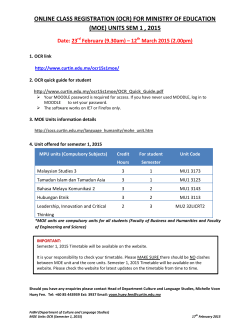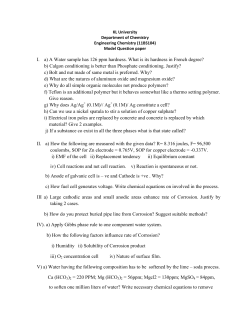
Building Australia`s Capability- WA Research in Subsea
Building Australia’s CapabilityWA Research in Subsea Engineering Professor Brian Evans, Director O&G research initiatives, Curtin University Curtin University is a trademark of Curtin University of Technology CRICOS Provider Code 00301J WA ORGANIC & ISOTOPE GEOCHEMISTRY CENTRE Temp Bridges: Chemistry Geology Earth Systems Environmental Science Modern / ancient analogues Past and Climate present environments Mass & life Extinctions Redox Toxic sediments Weathering World class exceptionally wellequipped analytical facility Biomarkers & isotopes Modern & ancient Spills Oil, gas and minerals Provenance Contact: Prof Kliti Grice k.grice@curtin.edu.au Curtin University is a trademark of Curtin University of Technology CRICOS Provider Code 00301J Pollution Biogeochemistry Food webs Nutrients Degradation Geomicrobiology WA ORGANIC & ISOTOPE GEOCHEMISTRY CENTRE Establish discrimination among fluids and new insights into the petroleum systems in the Dampier sub-Basin • Source rock characterisation • Fluid characterisation • Jurassic vs Triassic • Upper-Jurassic vs Middle-Jurassic • Oil–oil and oil–source rock correlations • Applications of novel techniques and ancillary analyses: comprehensive gas chromatography coupled to time-of-flight mass spectrometry (GCxGC-TOFMS), compound specific isotope analysis (CSIA), analysis of diamondoids. Northern Carnarvon Basin Curtin University is a trademark of Curtin University of Technology CRICOS Provider Code 00301J Centre for Marine Science & Technology Modelling of underwater noise emission from offshore pile driving (Chevron) • Develop comprehensive physical/numerical model of sound emission and propagation from offshore pile driving to accurately predict underwater noise levels and assess potential impacts of piling noise on marine fauna. • Models available until recent times are not capable of sufficiently accurate predictions. Press Enter to play movie Sound pressure in water and particle displacement in ground after hammer impact over three different seabed types water pile ram ground Curtin University is a trademark of Curtin University of Technology CRICOS Provider Code 00301J Centre for Marine Science & Technology Passive acoustic monitoring (PAM) of humpback whales on NW Shelf Chevron Acoustically detect and localize humpback whales to prevent potential harm, including ship collision, in offshore operational areas on NW shelf. Humpback cow with calf and escort Spectrograms with bearing data from 4 sensors Three whales detected 3 6 1 2 4 array of 4 acoustic sensors detected and localized whales 95% localization confidence Northing (km) 1 2 2 0 2 -2 3 4 -4 -6 6-6 Curtin University is a trademark of Curtin University of Technology CRICOS Provider Code 00301J -4 -2 0 2 Easting (km) 4 6 Centre for Marine Science & Technology Ship hydrodynamics (Chevron) • Ship under-keel clearance for ports- developing guidelines for LNG Terminal, Barrow Is • Wave-induced motions and mooring analysis for side-by-side vessels in waves. Measuring vertical motions of a tanker t.gourlay@curtin.ed u.au Curtin University is a trademark of Curtin University of Technology CRICOS Provider Code 00301J Centre for Marine Science & Technology Sound Scape in the Fremantle Inner Harbour (Fremantle Port Auth.) Three whales detected 3 1 Daily machinery, train (nearby bridge) & vessel traffic2 noise Dolphin whistles Curtin University is a trademark of Curtin University of Technology CRICOS Provider Code 00301J Vibratory & Impact pile driving noise Centre for Marine Science & Technology Dolphin transits when pile driving Dolphins transited the area within the vicinity of pile driving less frequently when piling than when no pile driving occurred (based on modelling using Generalized Estimating Equations) Curtin University is a trademark of Curtin University of Technology CRICOS Provider Code 00301J Clean Gas Technology Centre Gas Hydrate Research PVT Sapphire cell used for hydrate formation/dissociation testing, operated to -100Deg C under 500 bar pressure: Effect of MEG degradation on hydrate formation inhibition performance along gas systems: 1. Analysis of the best MEG inhibitor performance from different MEG suppliers. 2. Study of the various temperature degradation effects for different durations. 3. Hydrate formation temperatures using different MEG concentrations. Effect of thermal exposure on MEG with Film Forming Corrosion Inhibitor (FFCI) and MDEA and its Influence on inhibition of hydrate formation. Effects of inert gases on hydrate formation/dissociation of natural gas Thermodynamic modelling that establishes the prediction correlations of hydrate formation in presence of thermal degraded MEG Contact a.barifcani@curtin.edu.au Curtin University is a trademark of Curtin University of Technology CRICOS Provider Code 00301J Clean Gas Technology Centre PVT Unit (Sapphire cell) Curtin University is a trademark of Curtin University of Technology CRICOS Provider Code 00301J Curtin Corrosion Centre Weld qualification and field testing • Reduction in corrosion resistance of weld metal and mechanical properties during welding. Accepted sigma phase content: < 1 % • Need for portable test device to determine the corrosion resistance of these welds (an alternative to G-48 test). Chemical Etching- Sigma phase identified with orange-yellow colour. 50 µm Redox couple/Chemical potentiostat Pitting confirmed by appearance of Prussian blue colour Polarization Curtin University is a trademark of Curtin University of Technology CRICOS Provider Code 00301J 0% sigma 3.1% sigma phase phase test Contact r.gubner@curtin.edu.au 5.1% sigma phase Curtin Corrosion Centre Sea water ingress in 316 cladded pipelines Test feasibility of internally protecting subsea flowlines from sea-water corrosion Natural Sea-water 100 mm 6 m PVC TSA coating 316L SS • Corrosion potential remained well below Epit value for 316L • No pitting observed even after 2 months immersion period. Contact r.gubner@curtin.edu.au Curtin University is a trademark of Curtin University of Technology CRICOS Provider Code 00301J Curtin Corrosion Centre Corrosion under insulation (CUI- Santos) • Modification to the ASTM G189-07 • Electrochemical measurement to monitor the insulation dry-out period. • Investigation of wet/dry cycles • 3D surface analysis for localized corrosion • Correlate corrosion rate with different climatic and operating conditions. • Improve level of confidence in using carbon steel in benign conditions. Curtin University is a trademark of Curtin University of Technology CRICOS Provider Code 00301J Curtin Corrosion Centre Microbiologically Influenced Corrosion (MIC) Woodside Chevron CAPABILITIES: Microbial Diversity Profiling Electrochemical methods to study MIC Evaluation of microbial adhesion and biofilm formation: SEM, AFM, Fluorescence Microscopy. Identification and quantification of MIC microorganisms. Gene expression studies Metabolic activity levels Biocide Qualification Microbial adhesion and biofilm formation Materials susceptibility to MIC Curtin University is a trademark of Curtin University of Technology CRICOS Provider Code 00301J Curtin Corrosion Centre Microbial research & testing for oil and gas industry Laboratory cultures of sulphatereducing bacteria (SRB) Laboratory cultures of Acidproducing bacteria (APB) Curtin University is a trademark of Curtin University of Technology CRICOS Provider Code 00301J Scanning electron microscope image showing biofilms grown on CRAs. DGGE profiles of bacterial populations in biofilms grown on different CRA materials. Curtin Corrosion Centre Corrosion Inhibitor – JIP contact b.kinsella@curtin.edu.au Bare carbon steel Corrosion under-deposits and its inhibition. Corrosion inhibitor (organic surfactant) in CO2-saturated brine showing cylindrical aggregates formed at the surface Inhibition of localized corrosion at magnetite-deposited steels. Limits for corrosion inhibition at elevated temperature/pressure and flow rate. Synergistic effects of chemical compounds used in commercial inhibitor formulations. Corrosion inhibition in oil/wet systems affected by the presence of hydrocarbons. Corrosion and condensation rates in the presence of monoethylene glycol. Performance of corrosion inhibitors at welds. Corrosion inhibition of 13Cr stainless steels treated under extreme conditions. Curtin University is a trademark of Curtin University of Technology CRICOS Provider Code 00301J Curtin Petroleum Engineering Embedded sensors in drill rods and subsea plates Future long term equipment conditional monitoring using embedded sensors Contact b.evans@curtin.edu.au Signal Processing of Subsea Communications Underwater Communications with ROVs Future sensors for MWD using carbon fibre rods Curtin University is a trademark of Curtin University of Technology CRICOS Provider Code 00301J Curtin Petroleum Engineering Flowline sand detection (Chevron) Sand production causes erosion, inefficient separation, flow-line plugging Studies of non-intrusive acoustic sensors versus intrusive erosion sensors Characterising sand types and combining both to give high confidence alarm systems in the future Curtin University is a trademark of Curtin University of Technology CRICOS Provider Code 00301J Built Information Modelling (Woodside) System Integration Modelling Curtin University is a trademark of Curtin University of Technology CRICOS Provider Code 00301J BIM Technology (Woodside) As-planned Model Deviation Analysis As-built Model Curtin University is a trademark of Curtin University of Technology CRICOS Provider Code 00301J Centre for Offshore Foundation Systems Tolerably mobile foundations • Designed to move tolerably across the seabed to absorb some of the load imposed by thermal expansion of the pipeline. • Enables smaller foundation footprints, quicker, cheaper installation by smaller vessels. N == 123 Backward Forward Reconsolidation As flowline expands at PLET, flat base allows PLET to slide- slides back during shut-down Contact: Susan Gourvenec, susan.gourvenec@uwa.edu.au Centre for Offshore Foundation Systems O-tube Program • The O-tube allows ocean-pipe-seabed interaction to be simulated at large scale • Seabed mobility can be observed, quantified and now included in design • This has benefits for pipeline stability, which are leading to reduced project costs Contact: Prof. Liang Cheng, Professor of Hydraulics liang.cheng@uwa.edu.au Prof. David White, Shell EMI Professor of Offshore Engineering david.white@uwa.edu.au Centre for Offshore Foundation Systems O-tube Cyclone Simulation • Example test from STABLEpipe JIP, exploring stability limits (Woodside/Chevron funded) Draper, S., An, H., Cheng, L., White D.J., Griffiths, T.G. 2014. Stability of subsea pipelines during large storms. Philosophical Trans. of the Royal Society, DOI:10.1098/rsta.2014.0106 Centre for Offshore Foundation Systems Field data to verify new methods Historic survey data mining to model self-burial (Woodside) Leckie, S., Draper, S., White, D.J., Cheng, L. & Fogliani N. 2015. Lifelong embedment and spanning of a pipeline on a mobile seabed. Coastal Engineering. 95:130-146 Building Australia’s CapabilityWA Research in Subsea Engineering Thanks to the academic staff of: WA Organic & Isotope Research Centre Centre for Marine Science and Technology Corrosion Centre Dept of Petroleum Engineering Built Information Modelling Centre Centre for Offshore Foundation Systems Curtin University is a trademark of Curtin University of Technology CRICOS Provider Code 00301J
© Copyright 2025












